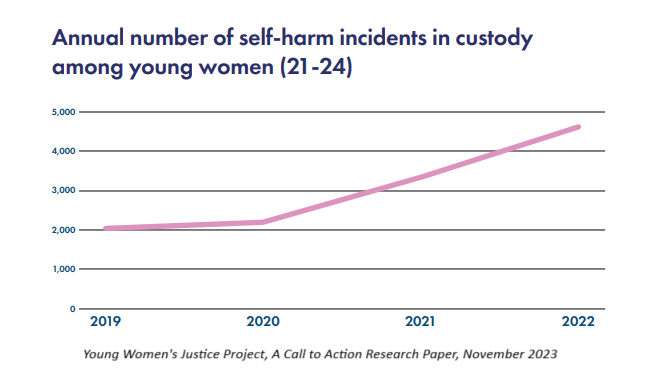Women’s prisons in the UK have seen a 63% rise in instances of self-harm. According to new research by Agenda Alliance and the Alliance for Youth Justice, in 2022 there were over 4,500 incidents of self-harm among female prisoners aged 21-24 in 2022. This is a stark rise from the 1,800 incidents recorded in 2018.
The research showed 80% of young women in custody report having mental health problems. Of these women, less than one third said that they felt cared for by prison staff.
The study also examined the multiple disadvantages of young women in prison. Younger women are more likely to be from black, Asian, Gypsy and Roma Traveller groups, or migrant backgrounds. These young women feel ‘unsafe, alienated, and retraumatised’ by a prison service designed around the needs of men and boys, or older adult women. 52% of young women in custody have been in local authority care as children, with the report stating that by the time a young woman encounters the criminal justice system, she has often already been ‘failed by numerous public services’.
One young Muslim female prisoner, who had been suffering domestic violence throughout her childhood, when she arrived at the prison, said: ‘There was no help on offer, nothing. I started contemplating self-harm. I was left to deal with my traumatic past of abuse on my own’.
This lack of support is underpinned by the fact that 60% of women received sentences which last less than six months, rendering them more unlikely to receive meaningful and sustained support from the system. All women are also more likely to receive custodial sentences for non-violent offences. The Young Women’s Justice Project says their crime usually stem from ‘complex trauma and economic disadvantage’.
Based on the findings of the report, Pippa Goodfellow, Chief Executive of the AYJ, concluded: ‘Having been failed by numerous public services, young women report being trapped in a damaging cycle of abuse, inequality, and offending…This report is a call to action to ensure that the needs of young women are no longer sidelined by the services and systems with responsibility for their support’.
Indy Cross, Chief Executive of Agenda Alliance, said: ‘Burying our heads in the sand and pretending this isn’t a problem won’t wash. The shocking levels of self-harm among some of the most vulnerable women must serve as a wake-up call; they’re unacceptable. We don’t need more reports. Government and experts all know the impact of traumatic histories – and we can see that too many young women keep falling through gaps.’






